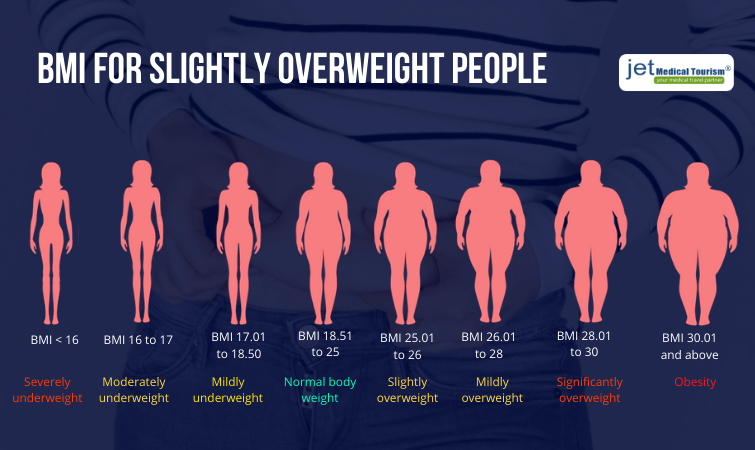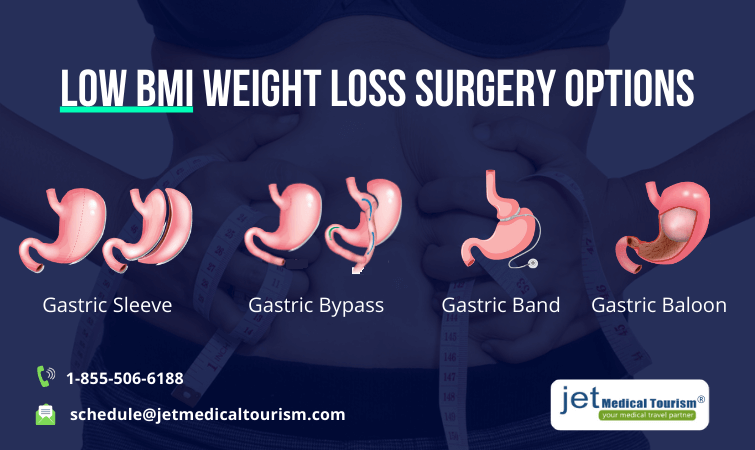Weight Loss Surgery For Slightly Overweight

Weight loss surgery for slightly overweight individuals can be a clinically recommended option under specific circumstances. To begin with, it is important to understand what is overweight and how it can affect your health and quality of life. It is best to consult a qualified bariatric surgeon, if you are looking for a professional answer to the question: “How overweight am I?” The surgeon will accurately measure your BMI and give you a clear picture.
Many people tend to ignore or fail to recognize that they are slightly overweight. In absence of corrective action, they can go on to develop mild obesity. The borderline between overweight and obesity is often quite thin. Remember that your body weight alone, which you can easily measure with a weighing scale at home, does not determine if you are overweight. If you are wondering about how to know if you’re overweight, talk to a skilled bariatric surgeon.
Weight loss surgery for slightly overweight people is possible. Jet Medical Tourism® is a provider of affordable bariatric surgery for slightly overweight individuals. Contact us today!
What is slightly overweight?
Many people want to know what does overweight mean and seek answers to questions such as: “Am I overweight or obese?” You will be considered slightly overweight if you marginally exceed the threshold of your ideal body weight in relation to your height. Person A and person B may both have a body weight of 160 pounds, but one of them may be slightly overweight and require weight loss treatment, while the other may not.
This can happen because the height of both individuals may vary, and the person with a shorter height will have a higher body mass index (BMI). Weight loss surgery for slightly overweight individuals may be acceptable, depending on your age, health, and your surgeon’s evaluation. The ASMBS recommends bariatric surgery for low BMI patients under certain conditions. You can review their current position statement on this subject.
BMI for slightly overweight

Once you have a clear understanding of what is overweight, it becomes vital to focus on how to know if you are overweight. Leading bariatric surgery associations around the world follow standard BMI categories to answer patients’ questions, such as “How overweight am I?” You can review the following list to understand the BMI for slightly overweight people:
- BMI below 16 – Severely underweight
- BMI 16 to 17 – Moderately underweight
- BMI 17.01 to 18.50 – Mildly underweight
- BMI 18.51 to 25 – Normal body weight
- BMI 25.01 to 26 – Slightly overweight
- BMI 26.01 to 28 – Mildly overweight
- BMI 28.01 to 30 – Significantly overweight
- BMI 30.01 and above – Obesity
Is it ok to be slightly overweight
No, it is not ok to be slightly overweight. Some people may keep ignoring their overweight condition until it takes the form of obesity or when they start developing obesity-related co-morbidities. It’s critical to ask a bariatric surgeon, “How overweight am I,” and is it ok to be overweight? A trusted surgeon will give you an accurate diagnosis and make the right recommendations.
Depending on your unique factors, weight loss surgery for slightly overweight may be a viable option for you. The International Federation for the Surgery of Obesity and Metabolic Disorders (IFSO) in 2014 also issued a position statement to endorse weight loss surgery for certain low BMI patients. Therefore, make sure to consult with an expert surgeon for BMI slightly overweight.
What does overweight look like

Your body will give you some indications when you are gradually putting on weight. If you are wondering what does overweight look like, here are three key signs to watch out for:
- Clothes Don’t Fit: You may start noticing that the clothes in your existing wardrobe no longer fit you well, or you feel that your dresses are becoming tight or uncomfortable.
- Unsightly Fat Pockets: You may be developing excess fatty tissue deposits in certain areas of your body. An expanding waistline, love handles, double chin, and loose upper arm skin may occur.
- Constantly Feeling Hungry: Your appetite may start increasing because people with BMI for slightly overweight will develop a bigger stomach. You may start eating larger portions and eat more frequently.
How to know if you are slightly overweight
One of the common questions people have is, “How do I know if I’m overweight?” If you find telltale signs that your body weight is increasing, and your weighing scale also confirms it, it is time to determine a clear diagnosis. You can take the following five simple steps:
- Step 1: Book a free consultation with a reliable and reputable bariatric surgeon.
- Step 2: Obtain a copy of your medical history to share with the surgeon before or during your consultation.
- Step 3: At the consultation, ask your surgeon about what is overweight and how to know if you’re slightly overweight.
- Step 4: Your surgeon will measure your BMI, review your medical history, and make a preliminary diagnosis.
- Step 5: Consider a weight loss surgery for slightly overweight if your surgeon recommends it as the best option.
Am I overweight or obese
At the time of your initial consultation with the weight loss surgeon, do not hesitate to ask: “Am I overweight or obese?” Low BMI obesity, clinically called Class 1 obesity, begins where the overweight threshold ends. Therefore, accurate measurement of your BMI in kg/m2 is vital to make a correct diagnosis and recommend the appropriate treatment plan.
What is Overweight?
Your bariatric surgeon may diagnose you as overweight if your BMI ranges between 25 and 30. BMI slightly overweight will mean that your body mass index is above 25 but below 26. From 26 to 28 BMI, you may be diagnosed as mildly overweight. If your BMI falls between 28 and 30, your surgeon may diagnose you as significantly overweight.
What is Obesity?
The moment your BMI exceeds 30, you will be clinically diagnosed as suffering from obesity. Mild obesity or Class 1 obesity occurs when your BMI ranges between 30 and 35. In general, patients who are 50 to 75 pounds in excess of their ideal body weight fall in this category. Weight loss surgery for slightly overweight may be a treatment option for you.
Weight loss surgery options for slightly overweight
Once you know what does overweight mean and how it can impact your health, you should discuss your best options with a competent bariatric surgeon. Different types of weight loss surgery for slightly overweight patients are available today with a high success rate.

Low BMI Weight Loss Surgery Options
- Gastric Sleeve Surgery: This is the most popular weight loss surgery for slightly overweight patients. It is relatively less invasive and produces excellent results. Your surgeon will remove about 75 to 80 percent of your stomach volume to create a small banana-shaped pouch. You will naturally eat smaller portions after a sleeve gastrectomy and lose excess weight.
- Gastric Bypass Surgery: This is the original, time-tested bariatric surgery for slightly overweight people in specific cases. Gastric bypass works in two ways – it reduces the stomach size as well as reroutes the small intestine for lower calorie absorption. As a result, you will lose excess weight more rapidly after this surgery. It also helps in resolving obesity-related diabetes.
- Gastric Band Surgery: This is a relatively less common procedure, but may work well as a weight loss surgery for slightly overweight individuals. Gastric band surgery involves the placement of an inflatable ring around the stomach to reduce its food storage capacity. The advantage is that the lap-band can be removed at any time in the future, which makes it a reversible procedure.
- Gastric Balloon Procedure: This non-surgical procedure can help slightly overweight individuals achieve successful weight loss. Gastric balloon technique involves the placement of a balloon in the stomach for about six months. This reduces the stomach’s capacity to store food, and helps train your body to eat less. It is a temporary solution, but can work if you are committed to your diet plan.
Am I A Candidate For Weight Loss Surgery? Find out here!
Are you wondering about what is overweight and whether you are a candidate for weight loss surgery? Your first priority should be to obtain accurate and transparent information about your treatment options. At Jet Medical Tourism®, we are committed to educating patients about weight loss surgery for slightly overweight and helping them make the right decisions.
We have on-board some of the best bariatric surgeons who will answer all your questions about how to know if you are overweight and what you can do about it. We encourage you to speak with our caring and compassionate representatives at Jet Medical Tourism®, and set up a free, no-obligation consultation with our weight loss surgeons. Call us now!





